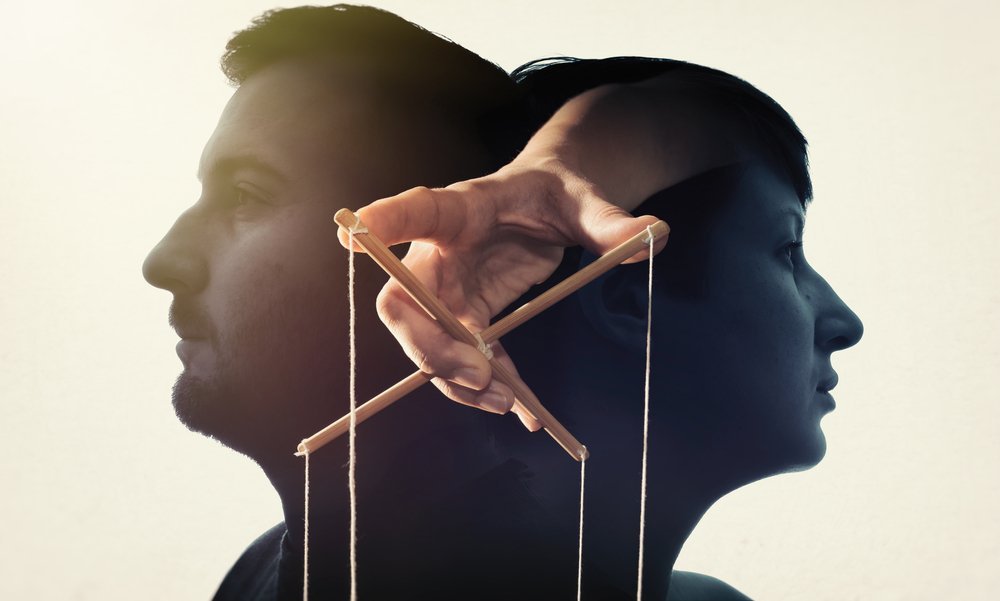Master manipulators use techniques which – over time – make it hard to spot when you're being used. If you believe you may be being manipulated by a friend, partner or family membes, Dee Marques shows you 12 signs to look out for and offers tips on how to deal with being used.
We all have certain expectations when it comes to our interactions with friends and romantic partners. This can include expectations about the needs we want met and in which way. But there’s a difference between expecting relationships to fulfil some needs, and using relationships to that end.
Unfortunately, not everyone understands the difference between both concepts, which is why it’s so devastating to find yourself in a relationship where you’re being used for certain purposes or needs.
In this article I’ll discuss several ways you can recognize when you are being used in any kind of friendship or relationship. I’ll also offer some ideas on how to deal with a relationship where you’re clearly being used.
The impact of being used
We tend to assume that we know people close to us, such as family members, partners and friends. So, realising that you’re being used by one of these people can come as a huge shock, because the idea is so far removed from what we had imagined our relationship to be. And understandably so, because you have probably invested a lot in a relationship in good faith.
RELATED: 7 signs your friend doesn't care about you
The impact that being used can have on an individual should not to be underestimated. This type of psychological manipulation can have a negative impact on mental health that can eventually cause anxiety.

Being used impacts on mental health and happiness
It can also create a tendency to become hyper-vigilant to avoid being used again and experiencing the same pain. Indeed, because being used puts us in a vulnerable situation, this can trigger mental or emotional health issues we may have had in the past, anything from eating disorders to depression.
• JOIN US! Sign up free today and find true connection at happiness.com •
This situation can also affect our confidence in our ability to accurately judge others. You may come to think that you’ve been taken advantage of because 'you didn’t see it coming and you should have seen it', and then conclude that you can’t trust your own judgement when getting into other relationships. In some cases, this can lead to emotional isolation and to mistrusting others by default.
12 signs you’re being used
So, how exactly do you know if you’re being used? The signs can be more or less subtle, so it’s important to be familiar with them.
1. You’re not equal players
An unequal relationship is one of the most common signs that you’re being used. A caring relationship is a space where both parties pull their weight emotionally, financially and physically.
You may suspect that you’re being used if the other person always seems to take but they don’t give back, or if they do give back but it feels as if they were doing you a favour. You can tell their attitude is not genuine and it’s not a one-off.
2. One-way boundaries
Similar to the above, or another version of it, is when you feel that boundaries only seem to work one way in the relationship. For example, the other person doesn’t really disclose much about previous romantic partners, but expects to know everything about yours.
“The impact that being used can have on an individual should not to be underestimated. This type of psychological manipulation can have a negative impact on mental health that can eventually cause anxiety.”
Or it could be a friend who always finds a way to be unavailable when you need them, but then expects you to be “on call” for them all the time. This can be a clear sign that you’re being used, because genuine friendships and relationships are based on mutual understanding and respect.
3. They 'show you off', but something feels wrong
Real friends or partners will appreciate you enough to sing your praises in front of others and it will come out as something genuine. However, people who see relationships as a way to use others may only show you off when it suits them, and it may be obvious enough to make you feel something is wrong.
For example, it could be a partner who only takes you out on business dinners because they know you’ll make an impression on the people they’re trying to impress. But any activities strictly between you and them are few and far in between or they do so after much insisting on your part.
4. They don’t listen
We can all be distracted from time to time or too absorbed in our own problems, but in true and equal relationship we always try our best to make time for the other person.
RELATED: Mindful listening – 6 ways to improve conversational skills
With manipulators, you may feel they’re never really 'present' when you’re together. Or they could seem present, but later on you realise they have tuned you out the entire time. For example, they forget important dates such as an exam, your birthday, or never follow-up on conversations where you've told them something important or that's bothering you.
5. You feel bad saying “no”
Some people are expert emotional manipulators to the point that they’ll make you feel uncomfortable saying “no” to them. For example, when they ask you for money it feels like you’re obligated and you can’t quite explain why. Or, you may feel pressured to do things their way, even though you don’t really want to.
There’s always some give and take in relationships, but you should be able to say “yes” or “no” freely and without fearing potential consequences, whether that's the silent treatment or other forms of emotional blackmail.

Users are master manipulators that play people shutterstock/SvetaZi
6. They keep tabs on favours
Manipulators are known for not offering to do you any favours unless they want something in return. In those situations, there’s a ring of “you owe me” to the whole interaction. In many cases, you will even be reminded of what they did for you and how much of a big deal it is.
• SIGN UP! Join our caring community and make new friends •
You may also feel as if they write down every single thing they do for you in a little notebook so they can refer back to it. That’s not altruism – it’s called being used.
7. They take things for granted
Manipulators may take you and your relationship for granted if they never say thank you or show any gratitude. Instead, it’s as if that aspect of the relationship was exclusively your responsibility.
8. They never apologise
Their behaviour causes you pain and yet they never seem to apologise. Somehow, if you feel hurt it’s your fault for doing this or for not doing that.
RELATED: The 6 steps to an effective apology
9. Money issues
Be wary of being used to meet the manipulator’s emotional or financial needs. There’s nothing wrong or unusual in lending or borrowing money from friends or relatives, but you should see a red flag if they’re always asking for money or expecting you to pay for all the bills, outings, etc.
“The impact that being used can have on an individual should not to be underestimated. This type of psychological manipulation can have a negative impact on mental health that can eventually cause anxiety.”
Another version of being used financially is if you’re in a romantic relationship or live together and the manipulator pushes you to accept higher-paying jobs to cover costs – even if they’re not what you want to do or are detrimental to your health.
10. They don’t keep their promises...
…or their appointments. Users can pull a no-show after agreeing to do something, or find excuses to get out of activities and plans. Even worse, you don’t feel comfortable confronting them about their wrongdoings.
11. Something doesn’t feel right
Nowadays, we’re all a bit disconnected from powerful and useful primal instincts, such as our gut feeling. So when something doesn’t feel right, we don’t know how to interpret it or we may even mislabel it as a positive emotion. For example, a manipulator can make you jittery or nervous and you could confuse the feeling with being “in love”.
12. The language they use
This seems a trivial point, but language can tell you a lot about how a person really feels about you. There’s a big difference between saying “I took you out” and “we went out”. The first implies you don’t really count and you’re being used, whereas the second suggests you’re both in the relationship as equal partners.
Tips on how to avoid being used
-
Strengthen your self-esteem This is the first and most important step because otherwise you won’t be able to apply any of the remaining suggestions. Learn how to develop self-love and be good to yourself at all times.
-
Set healthy boundaries Build up the courage to say what you can and cannot tolerate in a relationship, and explain why. Something along the lines of “when you do XXX it makes me feel,” and, “I can’t accept that because...”
-
Get your intuition back and learn to trust it again This will help stay open to other relationships instead of isolating yourself for fear of being used again. Discover how to better tap into your intuition.
-
Learn to be your own best friend, without giving up on the idea of finding your tribe.
- Seek help If you can’t overcome the pain of being used, seek help from a trusted counsellor or therapist.
Takeaway: being used hurts, but you can get over it
Realising you’re being used can be painful, especially if you were deeply invested in the relationship. But after experiencing it – and if you keep in mind the points raised above – you’ll be more equipped to detect future attempts of manipulation. Even better, you could even use that experience to help others overcome the pain of going through the same experience of being used. • Main image: shutterstock/fizkes
happiness.com | The fine art of being: learn, practise, share
Are you a happiness.com member yet? Sign up for free now to:
■ enjoy our happiness magazine
■ share and support in our happiness forum
■ self-develop with free online Academy classes
Written by Dee Marques
 A social sciences graduate with a keen interest in languages, communication, and personal development strategies. Dee loves exercising, being out in nature, and discovering warm and sunny places where she can escape the winter.
A social sciences graduate with a keen interest in languages, communication, and personal development strategies. Dee loves exercising, being out in nature, and discovering warm and sunny places where she can escape the winter.


Join the conversation
You are posting as a guest. If you have an account, sign in now to post with your account.
There are no comments to display.